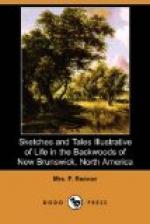Long years after, when he had forsaken the hunter’s path, and fought as a loyalist in the British ranks, among their Indian allies who smoked with them the pipe of peace and called them brothers, was one, in whose wild and withered features he recalled the stern Red Eagle; blood called for blood; he beguiled the Indian now with copious draughts of the white man’s fire-water, and he and another (brother of one of the murdered hunters) killed him, and placing him in his own canoe with the paddle in his hand, sent the fearful corpse down the rapid stream, bearing him unto his home. The wild dog and wolf howled on the banks as it floated past, and the raven and eagle hovered over it claiming it as their prey. The tribe, at the death of their Sagamore, withdrew from their allies, and, following the track of the setting sun, waged war indiscriminately with all.
And long after, though more than half a century had elapsed since the death of the Red Eagle, and when the snows of eighty winters had whitened the dark tresses of the young hunter, and bowed the tall form of the loyalist soldier; when he who had trod the flowery paths of the prairie, and slept in the orchard bowers by the blue stream of the Hudson, had, for love of England’s laws, become a refugee from his native land; and when here, in New Brunswick, he beheld raised around him a happy and comfortable home—his house, which had always been freely opened to religious worship, and in which had been held the prayer-meetings of the baptists and love-feasts of the methodists, became one day transformed into a catholic chapel.
A bishop of the Romish church was passing through the province, and his presence in this sequestered spot was an event of unwonted interest; many who had forgotten the creed of their fathers returned to the faith of their earlier days, and among the most fervent of those assembled, there was a small group of Milicete Indians from the woods hard by. With the idolatrous devotion of their half savage nature they fell prostrate before the priest. Among them was an ancient woman, but not of their tribe, who, while raising her head in prayer, or in crossing herself, Silas observed she used but one hand—the other was gone. This circumstance recalled to light the faded love-dream of his youth. He questioned her and found her to be Leemah, his once beautiful Indian bride, who had wandered here to escape the dark tyranny of her savage kindred. She died soon after, and “she sleeps there,” said the old man, pointing to where a white cross marked a low grassy mound before us, and time had not so dried up his heart springs but I saw a tear drop to her memory.
* * * * *
I turned my eyes from Leemah’s grave to see what effect the tale had made on the old lady, but she was so engaged in contemplating the golden curls of her doughnuts, and feathery lightness of her pound cake, she had heard it not; and even if she had, it had all happened such a long time ago, that her impressions respecting it must all have worn out by now. After having partaken of the luxurious feast she set before us, and hearing some more of the old man’s legends, we proceeded forward.




